The 1st Knowledge Co-Creation Program "Disaster Health Management in ASEAN countries" in Japan! - Driving our continued, enhanced collaboration on disaster health management as we strive to accomplish "One ASEAN One Response" - (2023-03-22)
The first Knowledge Co-Creation Program "Disaster Health Management in ASEAN countries" was held in Japan from 22nd November to 17th December 2022. Two participants from each AMS were selected based on those working for government, medical or academic institutions responsible for disaster health management or emergency medicine.
The idea behind this training is to promote "Mutual Learning" and "Knowledge Co-Creation," which are important ARCH Project strategies for the cooperation between AMS and Japan, for exchanging our experiences and knowledge, for learning from each other, and for helping to develop disaster health management that is compatible with local customs and culture.
[Program]
| 22 - 24 Nov (Kobe) | Participant's arrival day, Briefing, Observation tour (The Great Hanshin-Awaji Earthquake Memorial: Disaster Reduction and Human Renovation Institution) |
|---|---|
| 25 Nov (Kobe) | Presentation: Country Report |
| 28 Nov (Osaka) | Medical Insurance/Health Coverage system in Japan |
| Emergency medical service system in Japan (History, Management system, and structure) | |
| Observation tour: Emergency medical service facility | |
| Group Discussion: "The situation and challenges of emergency medical service systems in the countries and its solution" | |
| 29 Nov (Osaka) | The education of emergencies: The Osaka prefectural fire academy |
| The Great Hanshin-Awaji Earthquake's firefighting efforts and subsequent activities | |
| The situation of disaster response in Osaka Prefecture | |
| Group Work: "The situation and challenges of the healthcare provider education in the countries and its solution" | |
| Observation tour: Osaka castle | |
| 30 Nov (Osaka) | Mass Casualty Incident (MCI) control and management in Japan |
| Case Study: Fukuchiyama train derailment accident | |
| Group Work: "The situation and challenges of the MCI system and management in the countries and its solution" | |
| 1 Dec (Osaka) | Introduction: BHELP standard course |
| 2 Dec (Osaka) | COVID 19 response in Japan |
| Case Study: COVID-19 response in Japan (Accepting cases of hospitals and government response) | |
| Group Work: "The experience and challenges of the COVID-19 response and its solution" | |
| 5 -8 Dec (Kobe) | Trial C-course |
| 10-11 Dec (Tokyo) | Observation: Japan Disaster Relief Team (medical team) induction course |
| 12 Dec (Tokyo) | The disaster emergency medical response management in Japan after the Great Hanshin-Awaji Earthquake |
| Introduction: Disaster Medical Assistance Team (DMAT) | |
| Introduction: Emergency Medical Information System (EMIS) | |
| Case Study: COVID-19 response in Japan (Medical response and management on the cruise ship, etc.) | |
| The acceptance policy for international assistance during disasters in Japan | |
| Introduction: Disaster Psychiatric Assistance Team (DPAT) | |
| Lecture: Dr. Tony Redmond | |
| 13 Dec (Tokyo) | Introduction: Disaster response of International Federation of Red Cross and Red Crescent |
| Introduction: Japan Disaster Relief team | |
| 15 Dec (Kobe) | Presentation: Action Plan |
| 16 Dec (Kobe) | Evaluation session and Closing ceremony |
| 17 Dec (Kobe) | Observation tour: Hokudan Earthquake Memorial Park |
[Main activities during the course]
«25th November» Presentation: Country Report
The participants in this training were obliged to give their Country Report on the first day of the course. For this report, they had to research the country's current status of the emergency medical system and disaster health management. In this program, they were required to conduct the Country Analytical Work and develop Action Plans, while taking into account the knowledge and experience they had obtained during the training course. The Country Analytical Work aims to analyze the country's current situation and progress for the seven national targets stipulated in the Plan of Action to Implement the ASEAN Leaders' Declaration on Disaster Health Management (POA/ALD DHM) (adopted in 2017). The Action Plan is intended to move toward the national targets to be achieved by 2025 that participants have chosen to approach.
«28th November- 2nd December» Sessions in Osaka
Sessions in Osaka were primarily held at the Senri Critical Care Medical Center. By inviting the speaker from the pertinent responsible facilities, the participants attended lectures and observation tours on the topics of the overall medical service system in Japan, which includes the emergency medical service system and disaster medical response management. The participants also discussed case studies and experiences in order to find solutions to the challenges facing the nation.
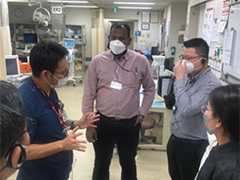
«5th - 8th December» Trial C-course (Coordination course for EMTs)
The experimental C-course was conducted as part of this KCCP Program. This course is based on one of the standard curricula that the project has developed which contributes to strengthening the in-country coordination capacity of the Public Health Emergency Operations Centre (PHEOC) in each AMS country to be able to manage incidents occurring in each country including the context where international and domestic EMTs are arriving. The project anticipates that each AMS would redevelop this course after it has been fully created, taking into account and adopting the national policies and regulations to this standard curriculum. In the process of the course development, the project coordinated with Japan and other AMS countries in order to share the experiences and lessons learned, especially taking into account the international standards of the data management system, the development of which Japan has led. After this trial run, the training will be modified and refined, and the implementation of C-course adapted to local context is planned prior to the 5th Regional Collaboration Drill in Malaysia.
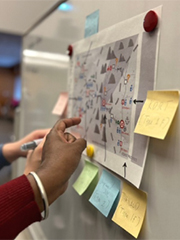
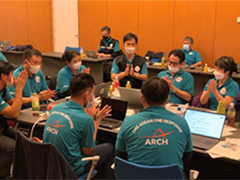
«10th - 13th December» Sessions in Tokyo
The participants observed the induction training course of the Japan Disaster Relief (JDR) Medical Team over the weekend. Participants were also invited to the simulation exercise where they acted as simulated patients, and their compelling performances were seen as responsible personnel in the development of the country's emergency/disaster medical providing system. Lectures and discussions were also held on Disaster Medical Assistance Team (DMAT), Disaster Psychiatric Assistance Team (DPAT), and International Red Cross, as well as JDR.
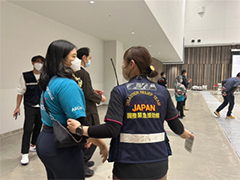
«15th December» Presentation: Action Plan
The Country Analytical Work and Action Plan, which the program's participants had created, is anticipated to be used as a national action plan for assisting the country reach its goal under the POA/ALD DHM.
The Country Analytical Work and Action Plan which were drafted by the participants in this program are expected to be used in further consultation with focal points of the ARCH Project in each AMS to utilize as a national action plan to achieve the national target of the POA/ALD DHM. Every nation faces different difficulties and has different goals. Participants have a good understanding of the nation's potential and goals, and they are mindful that they will face a number of obstacles along the road. Therefore, the fundamental goal of this program is to reaffirm the significance of achieving their objectives in the ASEAN region while working together and supporting one another.
Targets at the National Level
1. Each ASEAN Member State has at least one I-EMT that is compliant to either ASEAN or WHO I-EMT minimum standards.
2. EMTCC has been established.
3. National SOPs for the Coordination of EMTs which determine the protocol in EMT coordination; such as, the request and offer of assistance, RDC process, CIQ process, or the authorization of healthcare professional have been developed.
4. Standard reporting system for EMTs has been developed.
5. Each ASEAN member state has a disaster health training system responsible for the implementation of capacity development, knowledge management, research and development initiatives in collaboration with other designated training centers of AMS and with relevant academic networks, as appropriate.
6. Disaster health management concept introduced in health education for relevant countries.
7. Safe hospital projects and programmes are initiated to enhance hospital preparedness and response along with quality assurance mechanism (continuous assessment).
«Closing Ceremony - future actions»
All participants received their program certification on 16th December and shared the appreciation of their encounter. Through the program, the participants said "there are a lot of fresh concepts for the growth of our disaster health management system".
The ARCH Project will continue to follow-up and support the progress all the way until AMSs reach their goals.
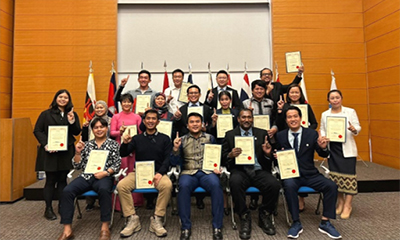
Here, the Project would like to share the closing speech by Mr. Ronald Low from the Philippines.
What does this KCCP program mean to us?
Whether we are from a disaster-prone country or not, we realize we all need to be prepared to help ourselves, and in solidarity, help others as well, being one ASEAN community. Japan with all of its disaster experiences and developments in disaster management also faces a lot of challenges and cannot do it alone. Our countries cannot do it alone either. So, we must work together.
What did we go through?
We've seen all the elements and systems of Japan disaster health management at its best. Aside from learning from the best practices of the Japanese system and exchanging insights with our Japanese and ASEAN experts, the past days have been filled with very good memories that make us feel we are already "family". New learnings, newfound friends, of course, action plans with concrete outputs that make a difference we believe are the success factors of this KCCP program.
What are we going to do moving forward?
We will make sure that our action plans will be carried out. We will keep in touch as an active and able network that will constantly exchange experiences and collaborate to develop solutions for our problems and issues. And we will help spread the word about the ARCH project and our goals so that One ASEAN, One Response will be realized. The ARCH rainbow composed of many different colors will appear as a sign of hope for the future if we can be successful with what we want to do.
The road that lies ahead will be full of challenges - but don't forget, we were also able to see some opportunities. Our new learnings, expanded network, and sustained support of Japan surely will allow us to build more bridges in our ASEAN community. With our leadership and commitment back home and our collaboration with one another, we can do more together and go farther. The vision of the ARCH project will live on - we're here to make a difference through disaster health management. We will let the legacy of Batch 1 KCCP live on!
